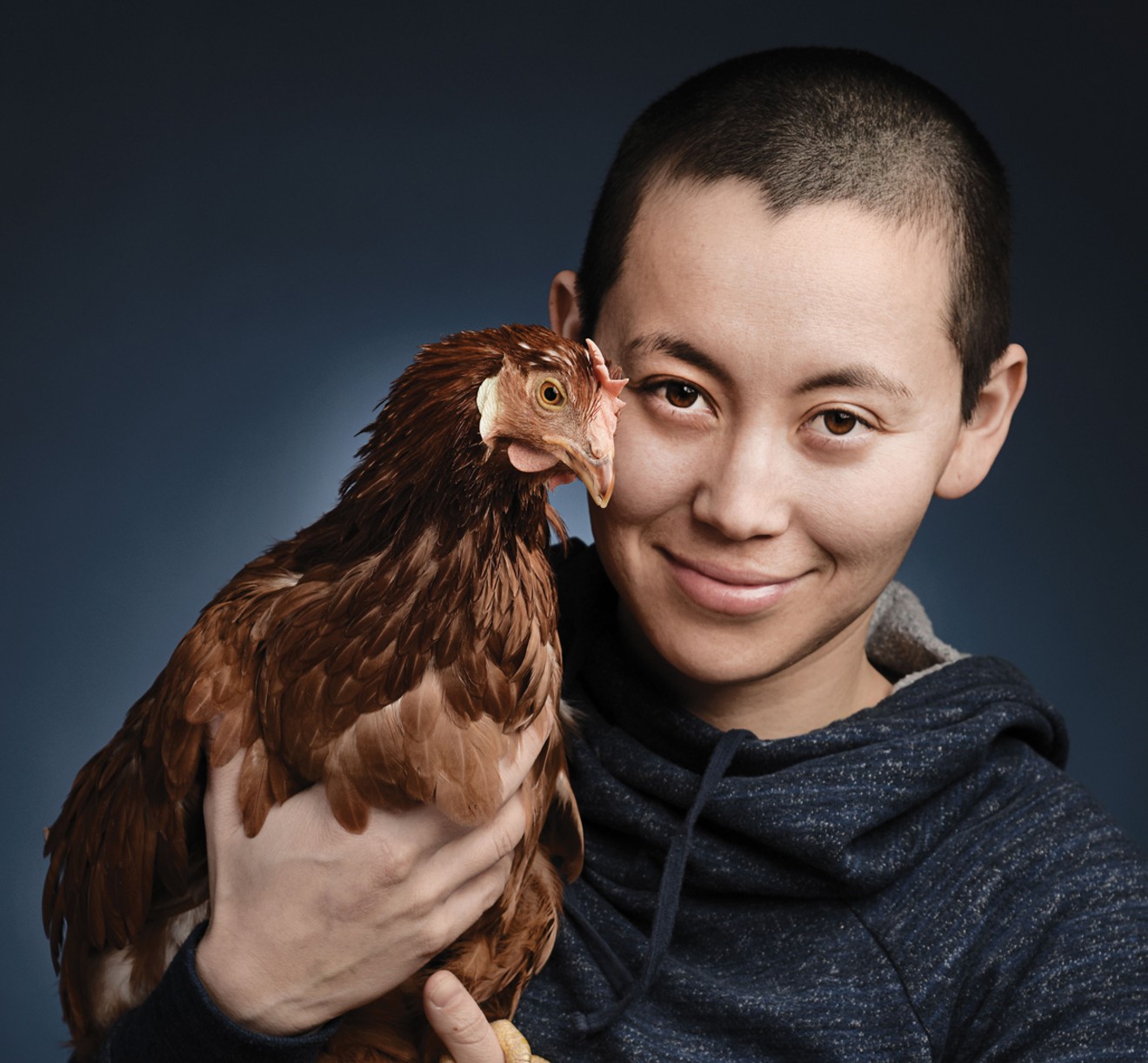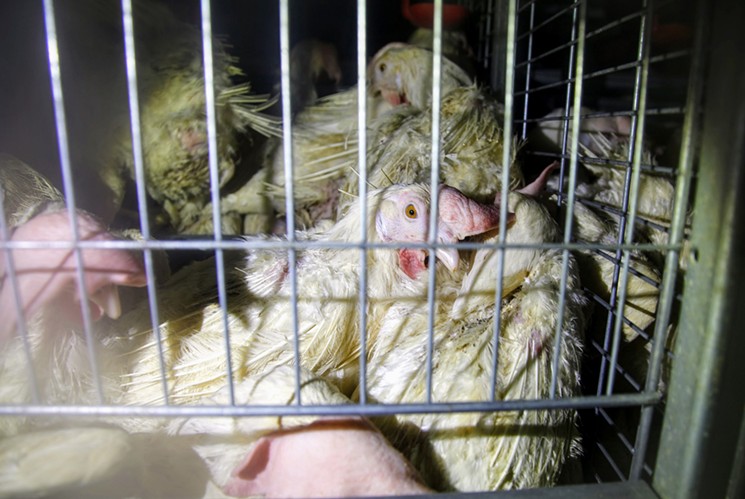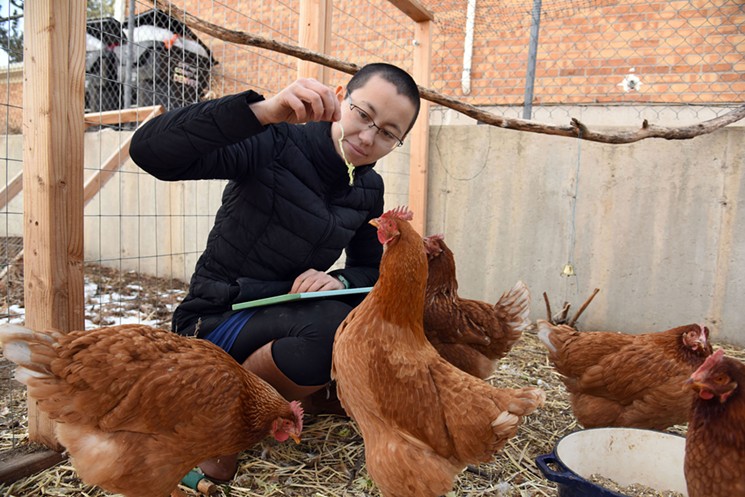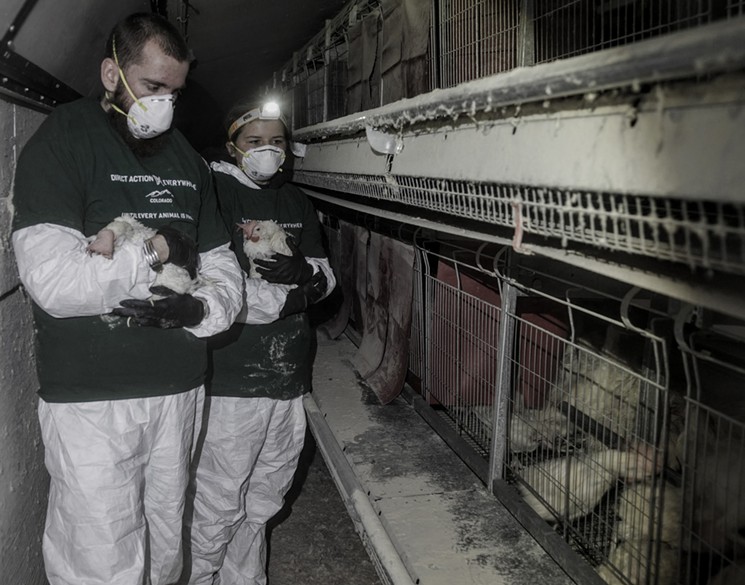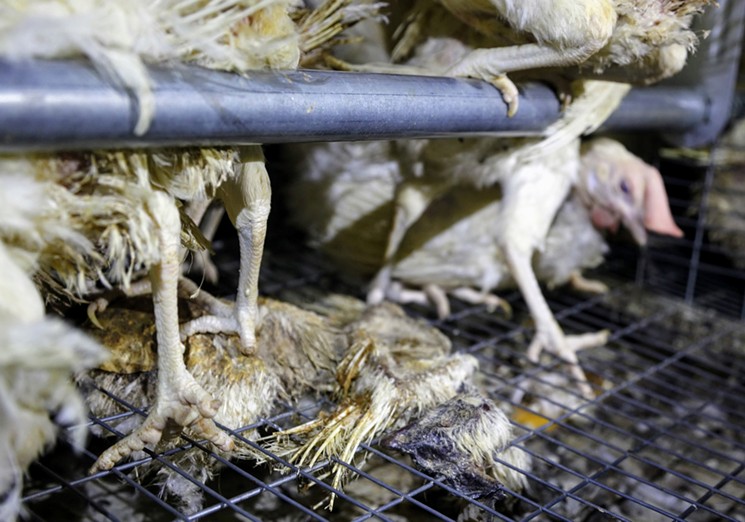After hopping a barbed-wired fence, Aidan Cook and three other animal-rights activists quietly zipped up their white hazmat suits while two cohorts kept watch.
The hum of industrial fans outside two massive barns — each holding tens of thousands of egg-laying hens — drowned out any competing noise. Still, the activists whispered when they spoke.
The members of the Colorado chapter of Direct Action Everywhere — known locally, nationally and internationally as DxE — were conducting an illegal “investigation” of Colorado Egg, an industrial-scale farm in Weld County that supplies Costco stores on the Front Range and beyond with cage-free eggs.
Costco boasts on its website that 84 percent of its eggs are sourced from cage-free farms as of October 2017, up from just 2 percent in 2006. Dubious of the claim, DxE members decided to investigate one of Costco’s suppliers for themselves.
After zipping into their suits on this cold October night, the activists put on surgical masks and, as a finishing touch, pulled dark-green shirts on over their suits that read “DIRECT ACTION EVERYWHERE.”
DxE has over forty chapters and thousands of volunteers across the U.S., Europe and Southeast Asia. They connect and recruit through social media and hold monthly conference calls. The local chapter of DxE has drawn attention and ire for trespassing on farms and documenting conditions with videos and virtual-reality cameras. The group is known to rescue — or steal, depending on whom you ask — animals that it feels are in danger.
While some animal-rights groups, like People for the Ethical Treatment of Animals, seek out “factory farms” and research laboratories with the most egregious conditions for their exposé-like documentations, DxE has focused instead on taking consumers inside animal agriculture facilities that market their production processes as humane. It aims to show that there is no middle ground in what it sees as the fight to free animals from human use.
As Cook and the other activists walked closer to the barns, their headlamps illuminated thousands of hens.
Many of them looked sick, with bent beaks and wilted feathers. An inch of feathers and feces covered the floor beneath the cages, and mice and maggots rummaged through rotting eggs. The activists started taking photos and videos of the conditions, occasionally stopping when they saw a dead hen.
Cook explained that the U.S. Department of Agriculture can categorize any egg farm as “cage-free” if hens are not housed in battery cages, which provide them an average of just 67 square inches of living space.
“At this facility, what they’ve done is basically took a battery-cage facility and took out the walls separating the cages,” Cook said.
Costco and Colorado Egg declined to comment for this story.
As DxE members inspected barns, Hana Low, a nurse and longtime member, found a hen with an enormous open wound from the top of its head down its neck. “I’ve never seen anything like this,” Low said.
After some debate, the activists decided to take the bird and provide it with veterinarian care. They also took another bird, this one emaciated with discolored and withering feathers, and named them Bella and Joliet, respectively.
Back in the frigid cold at Colorado Egg, hens in hand, Cook, Low and the others stripped off their gloves, hazmat suits and surgical masks before hopping back over the fence and running away on a dirt road. Soon the group was driving back to Boulder in a warm car, the hens wrapped in fuzzy blankets.
Just when the young activists thought they were in the clear, the car pitched across the road at 60 miles per hour.
Screams filled the car, and the tires screeched. The car headed for a concrete barricade before mercifully righting itself.
“Did we almost hit a deer or something?” someone asked.
“No,” shouted Cook from the passenger seat. “It was a raccoon.”
Cook says DxE has entered the Colorado Egg barns “between one and fifteen times” over the past few months — he wouldn’t say exactly how many times, for fear that Colorado Egg will ramp up its security — and that ten more hens have been taken.
Along with rescuing farm animals that members believe to be in danger, DxE stages protests at slaughterhouses, family farms, large sporting events and even vegetarian and vegan restaurants to try to get its message across the Front Range. DxE’s tactics include traditional sign-in-hand protesting, singing songs outside slaughterhouses — Cook occasionally plays a flute at these so-called vigils — and confronting patrons of restaurants as they eat.
Though DxE gets backlash from omnivores and vegans alike and draws the attention of local law enforcement and the FBI, members don’t seek anonymity. The group publishes its findings online, disclosing the names of the individuals who take part in investigations and even tagging the farms it has broken into on Facebook.
Bella and Joliet are now living in “protection” with DxE activists and have made almost a full recovery with professional veterinary care.
Other hens and animals from DxE “open rescues” are living with members around the Front Range. Low says that the recovery period after an open rescue, when hens have unlimited access to food, water, space and even cats and dogs to play with, is the most important part of what DxE does.
“We make sure to give them the highest-quality care,” Low says. “It’s not about us.”
When Cook isn’t leading one of the most controversial animal-rights groups in the country, he’s attending classes during his last year at the University of Colorado Boulder.
Cook is tall, bearded and has a sprawling forearm sleeve that depicts the Hindu deity Ganesha blowing the universe out of a flute. He divides his life into two halves: before and after he dove headfirst into radical politics.
Before radical politics, Cook says, he was trapped in the “Boulder Bubble,” in which affluence and cozy liberal politics insulate the city from life’s harsh realities. “I used to really be bothered by the term ‘Boulder Bubble’...but there are definitely urgent issues facing our society, and it’s easy to not notice them here,” Cook explains. “That doesn’t really affect people here. So I cared about the environment, but not enough to do anything, and I certainly wasn’t an activist in any sense of the word.”
In middle and high school, Cook gravitated toward art and music for self-expression, participating regularly in theater productions and picking up several instruments, including the shakuhachi, a Japanese flute.
In 2013 he decided to stay in town for college and enrolled in the College of Music at CU Boulder.
After years of being a vegetarian — a decision inspired by a gruesome PETA video of a slaughterhouse — Cook opted to go vegan during his freshman year.
He wanted to prevent brutality against animals by literally not buying into their slaughter, and by lessening, even in a very small way, the environmental impact of meat production, beef in particular. (In 2006, the amount of greenhouse gas emissions from cattle worldwide surpassed the amount of emissions from automobiles.)
But instead of feeling satisfied, Cook says that becoming a vegan isolated him, and the isolation pissed him off.
“For the first eight months, pretty much the only emotion I experienced was anger,” he admits. “I was so angry [because I] didn’t know any other people who were vegan. But I stumbled, by total chance, into a meeting of this campus vegan club, which at that time was six people meeting in a basement once a week and talking about how fucked up the world is and not knowing what to do about it.”
In 2015 he saw a Bay Area-based behavioral economist and animal-rights activist named Wayne Hsiung speak at an animal-rights conference in Virginia about a new activist network called Direct Action Everywhere.
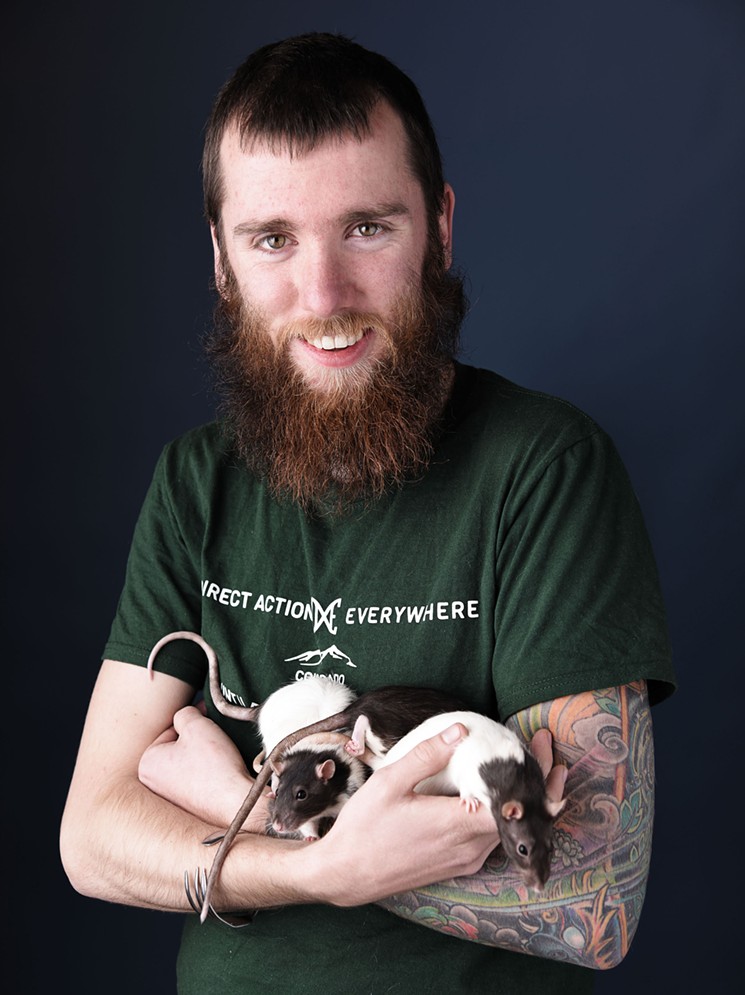
Aidan Cook helps lead the Colorado chapter of Direct Action Everywhere, an ambitious yet controversial group of animal-rights activists.
Anthony Camera
Cook says that he was persuaded by Hsiung’s argument that veganism, while a step in the right direction, is not enough to move society away from using animals for food and clothing.
Cook uses an analogy to explain Hsiung’s point: If you are in a parking lot in the summer and see a dog trapped in a sweltering car, you have three options. First, you can ignore the dog in the hot car; second, you can disapprove but do nothing; and third, you can break the window and save the dog.
Eating meat or using animal products is the first option, while veganism, Cook argues, is the second, and animal-rights activism is the last. As of last August, Coloradans can legally break into a hot car to save the life of a child, dog or cat, so why, Cook wonders, can’t cows and chickens be rescued as well?
Inspired by Hsiung, Cook began to seek like-minded individuals in 2016 and found one through a mutual friend in Low, the activist who found Bella at Colorado Egg. Feeling disenfranchised, and galvanized after witnessing animal testing during an internship, Low had shifted from biology to nursing at Colorado College and had taken up animal-rights activism.
Low and Cook started tapping vegan grocery stores, potlucks, online forums and restaurants to build an activist network.
They founded the Colorado branch of DxE in 2017 and turned it into one of the most active animal-rights organizations in the U.S., says Hsiung. Members jumped barricades at a political rally and a Colorado Rockies game to draw attention to their cause, earning national and even international headlines.
“We’re blown away by the work that Hana and Aidan and everybody...has done over the past couple years,” says Hsiung, who has led the main DxE chapter, based in the Bay Area, during several high-profile protests and rescues. “Obviously I am a little bit biased, but I think that [their work] is among the most cutting-edge activism that’s happening — not just in the animal-rights movement, but in the world of activism.”
That feeling isn’t shared by all who have encountered local DxE activists.
Last spring, DxE and its affiliate, Denver Baby Animal Save, held a protest outside City, O’ City, a popular vegetarian restaurant in Capitol Hill. About a dozen animal-rights activists were trying to persuade the restaurant to go 100 percent vegan, holding signs calling for animal “liberation,” singing songs, and showing videos of dairy factories through the windows, which owner Dan Landes eventually covered.
“Their first attack was to come in the restaurant and do some weird chanting or something and hold signs,” says Landes. “Then we asked them to leave.”
The activists have continued to hold weekly protests on the sidewalk outside of the restaurant.
Landes was a vegetarian and later a vegan for years, but says going full vegan isn’t realistic for his business.
“I want to continue to have the conversation about how we eat in America, and I would hope that City, O’ City inspires people to have the conversation about animal husbandry and how we eat,” he says. “But that’s not what inspires me, to be coerced by protest. I have 140 employees I have to take care of, too.”
DxE has staged protests in other parts of Denver and faces a litany of criminal charges around the state.
From July through September 2017, Superior Farms filed six different trespassing charges against activists from Denver Baby Animal Save after the group, which is an offshoot of DxE and shares many of the same members, began holding bi-weekly meetings at the lamb slaughterhouse in the Elyria-Swansea neighborhood.
The activists — mostly white and either in college or in their early twenties — held vigils for the lambs that were to be slaughtered.
The Denver Police Department often monitors the vigils from a distance.
DPD officer Mike Kelly stood next to his car during an October vigil, looking tired and vaguely annoyed. He was soon joined by a steely-eyed security guard from Superior Farms.
Kelly said that the police had been keeping watch to make sure the activists didn’t trespass or damage the slaughterhouse’s property, but that they were usually well-behaved, despite the six trespassing charges.
A man who had been outside a liquor store across the street approached the group.
“I’m just checking these white people out, man,” he said, laughing. He pointed to Superior Farms and said, “I used to work there!”
The activists pleaded not guilty to trespassing at the end of November but reached an agreement with the city to not go near the slaughterhouse and to do community service. In exchange, the city dropped the case. Animal Save members not charged with trespassing, and even some newbies, continue to hold vigils at Superior Farms.
Cook says Animal Save has made an effort to engage with the community around the slaughterhouse by cleaning up the bike path that runs adjacent to the Platte River and handing out food to the homeless who camp there.
Five activists, including Cook and Low, face theft charges in Larimer County for their role in a rescue at a small farm in Berthoud last September. The activists targeted Long Shadow Farm, a family-owned poultry farm that raises its birds in big enclosures rather than battery cages or enriched colony cages, which animal-rights activists liken to the former.
Run by Larry and Kristin Ramey, the farm offers public workshops on how to humanely slaughter birds.
“We started this farm because we think confined animals and feed operations are awful and the conditions these animals live in are terrible,” Larry Ramey told Westword’s Michael Roberts in September. “I’m not a fan of PETA, but if you go to their website and look at those videos of how animals are treated, or if you go to Greeley and see 8,000 cows living on Poop Mountain getting ready to be fed into the slaughterhouses...well, we don’t support that, and we’re trying to provide an alternative to people.”
But to DxE, the very act of slaughtering poultry is inhumane, so Cook, Low and two others approached the farm disguised as volunteers who wanted to help with a workshop, and instead staged a protest with about forty other activists. Three chickens were taken.
The disruption sent a wave of concern through the Colorado poultry and egg community, says Judi Casey. She’s co-founder of the Colorado Chickens Facebook group, where over 10,000 backyard and big-operation farmers alike can trade tips on raising and slaughtering hens and roosters. Casey says DxE’s actions at Long Shadow are counterproductive.
“It seems to have driven a lot of people to fear for the safety of their flocks and themselves,” says Casey.
In July, Cook, Hsiung and other DxE activists entered the massive Circle Four Farms in Milford, Utah. The facility is owned by Smithfield Foods, the world’s largest producer of pig products (slaughtering up to 100,000 pigs a day). Smithfield has come under fire in recent years for its use of gestation crates.
Much like the battery cages used to confine egg-laying hens, gestation crates are used to contain pregnant sows — so tightly, opponents say, that sows cannot turn around or even lay down. Nine states in the U.S. have banned the cages along with the United Kingdom and New Zealand, and Canada and the European Union have committed to limiting their use.
In 2011, mounting pressure from groups like the Humane Society convinced Smithfield to commit to removing gestation crates within ten years. But DxE members, skeptical of Circle Four Farms’ general conditions even without gestation crates, decided to see for themselves what was going on in the enormous barns.
This time, the activists came equipped with virtual-reality cameras — a huge advantage, says Hsiung, in showing the public exactly what it is like to be in such farms.
The investigation yielded graphic images: hundreds of sows confined to gestation crates literally screaming, piglets sucking blood, and dead animals. Two piglets named Lucy and Ethel were stolen by DxE, which publicized the theft in a virtual-reality video that had over 50,000 views on Facebook in days — and quickly caught the attention of Smithfield.
In a statement, a representative of Smithfield told the New York Times that the video had “blatant inaccuracies.”
“This video, which appears to be highly edited and even staged, is an attempt to leverage a new technology to manufacture an animal-care issue where one does not exist,” the manufacturer said.
Smithfield alerted the authorities and contracted an independent audit from experts, including Utah’s top state veterinarian, who found no animal mistreatment. For months, that seemed to be the extent of the investigation — until the FBI began knocking on doors in Utah and Colorado, looking for the two stolen pigs.
According to Cook, FBI agents carrying a search warrant for DNA samples from pigs named Lucy and Ethel arrived in late August at Luvin’ Arms outside of Boulder, which describes itself as a “place of refuge for abused or neglected farm animals.”
Though Luvin’ Arms avoids associating itself with DxE, and Cook won’t confirm whether the two pigs were being held at the farm, a spokesperson for the FBI field office in Salt Lake City confirmed to Westword that agents were conducting “court-authorized activity...related to an ongoing investigation.”
Cook and members of DxE are prepared to be prosecuted under the Animal Enterprise Terrorism Act — a lesser-known piece of legislation signed into law by President George W. Bush — for their participation in rescues. The AETA criminalizes the use of interstate commerce, such as driving on interstates or using a cell phone regulated by the Federal Communications Commission, in the process of damaging or interfering with animal agriculture operations.
The penalty for a felony AETA conviction is tiered by the economic and bodily damage caused by sabotage or something like a rescue. Only a handful of animal-rights activists have been prosecuted under the law.
“On the surface it does worry me, but I know the reason why I am doing this, deep down, is because morally there is no right way to enslave or murder someone,” says DxE member Kelly Landreth. “Every single one of these animals needs to be rescued...and if the public gets to see what we are doing, I believe that they will stand on our side, because we are doing the right thing: We’re rescuing, and we’re saving lives.”
Low agrees. “I’ve thought about the sacrifice — what I would be willing to face jail time for and face legal charges for. And this is the only thing that I would really do that for.”

David Crawford co-founded Rocky Mountain Animal Defense in 1994, an influential animal-rights group that staged protests around Colorado.
Anthony Camera
Crawford, a former journalist who chooses his words carefully, says he became concerned about the treatment of animals while working in a slaughterhouse at the age of eighteen. “I saw horrific things,” he says.
He later moved to Boulder and fell in with animal-rights activism when some CU students organized against an annual bear hunt in the mountains.
RMAD worked with other groups, including the Vegetarian Society of Colorado and the Peaceful Prairie Sanctuary, to raise awareness of animal cruelty. At the group’s height, RMAD’s newsletter circulated to thousands of Front Range residents and galvanized hundreds to protest.
Members investigated animal cruelty at the Denver Zoo and animal testing labs at CU, stopped construction of a Plexiglas zoo at the entrance of Rocky Mountain National Park, protested the National Western Stock Show with a seven-foot-tall fake cow, and raised public awareness on a plethora of issues, from Colorado wildlife regulators’ practice of gunning down coyotes from helicopters to the infamous prairie-dog shoots — during which landowners organized shooting matches to eradicate the alleged pests — in Nucla and other towns.
The animal-rights scene in Colorado and the country changed in October 1998, when activists associated with the Earth Liberation Front, or ELF, set fire to several ski lifts and the Two Elk Lodge at Vail Resorts. ELF says it did so to protect a declining lynx population, but Crawford — who did not participate in the arson — says that the backlash was enormous. Across the U.S., people now distrusted even peaceful animal-rights advocacy.
After the arson, Crawford says RMAD was targeted by the FBI. He claims that federal agents collected a DNA sample from a friend on his doorstep and confiscated a laptop from another.
In 2002, Crawford found himself reading his own file during the Denver “Spy Files” fiasco, in which the ACLU of Colorado exposed the DPD’s decades-long wiretapping and investigations of left-wing activists, including a local nun and some Quakers. Then-mayor Wellington Webb disclosed that the DPD’s Intelligence Bureau had been working with the FBI’s Joint Terrorism Task Force to monitor “criminal extremists,” including RMAD and the Quakers.
Crawford is reluctant to say whether he approves of DxE carrying the torch of animal-rights activism in Colorado for fear of dividing the movement, an indication that DxE is divisive even within its own community. As for DxE's action at City, O' City and other vegetarian restaurants, Crawford says that there is generally a “race to the bottom” among animal-rights groups “to see who [can] do the most outrageous act.”
Perhaps the harshest criticism of DxE from inside the animal-rights community comes from Gary Francione, a law professor at Rutgers, CNN commentator and giant in the modern animal-rights movement. He doesn’t beat around the bush.
“I mean, DxE, they have their vigils where they hold candles and wear coordinated T-shirts and they promote rescuing the animals and go into restaurants and scream at people who are eating,” Francione says. “They have these signature tactics, which I think are really counterproductive. They reinforce the idea that people who have views on the moral status of animals are nuts.”
It’s a criticism that Cook is familiar with. “People definitely say things like that,” he says. “‘You’re just trying to make vegans look crazy!’ Or, ‘These idiots are just doing these things to get attention!’” But he believes that extreme tactics are the only way to make DxE’s message known.

"Rescued" animals are taken into sanctuary and healed by veterinarians and DxE volunteers.
Direct Action Everywhere
Abrams says that the animal agriculture industry has been trying to be more transparent in recent years by letting more reporters into facilities generally closed to the public and by releasing informative videos about industry-wide practices. The industry took a big leap forward, she says, when JBS — the largest meat producer in the world — opened the doors of its gargantuan slaughterhouse in Greeley to reporters for the first time in 2015.
Groups like DxE could reverse those gains by constantly breaking into farms, Abrams argues.
“I would say that is a step to thwart industry transparency efforts,” she says. “It raises suspicions and makes farmers and other people engaged in the animal production facility more suspicious of people who say that they are part of the public and want to learn.”
Daren Williams, a spokesman for the Centennial-based National Cattlemen’s Beef Association, says he is working with more members of the media and the public than ever before.
“We also admit our flaws and have nothing to hide,” he continues, “which is kind of the implication behind these activities — that we are trying to keep people out or have something to hide.”
But DxE doesn’t trust the animal agriculture industry to improve conditions on its own. Instead, it’s charging ahead to raise more money for more rescues, issuing a call for donations recently on its Facebook page that received more than $50,000 within two weeks.
“As far as I can see, we definitely won’t be stopping soon,” Cook says.

